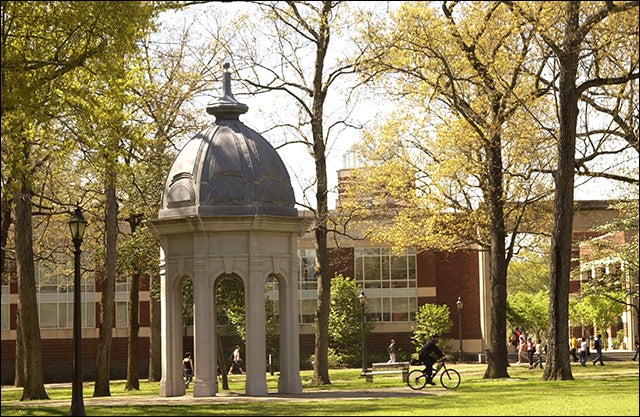A SUSTAINABLE ECU
Draft recommends more compact footprint

A committee appointed to develop short-term and long-term fiscal and operational plans for East Carolina University has recommended a more compact organizational footprint for the university, with fewer degree programs, fewer administrative positions and fewer low-enrollment classes.
The University Committee on Fiscal Sustainability on Friday distributed a draft set of recommendations to ECU faculty, staff and students that include money-saving, efficiency and sustainability measures in five areas: operations, organizational structure, academic programs, faculty workload, revenue and other.
Chancellor Steve Ballard appointed the committee in August 2013 to come up with steps that could help the university deal in part with declining state appropriations while continuing to invest in strategic priorities. The measures in the draft report cover a time frame of a few months to five years.
Feedback Forums
Tuesday,April 8
4-5:30 p.m.
Mendenhall Student Center
Great Room 3
Main campus
Wednesday, April 9
4-5:30 p.m.
Brody Auditorium
Health Sciences Campus
“Current funding, from all sources, is under continuing downward pressure and few new resources are available for investment in strategic priorities,” said Rick Niswander, vice chancellor for finance and administration, and Ron Mitchelson, interim vice chancellor for research and graduate studies, co-chairs of the committee and spokespersons for the draft report. “The university must employ all resources in the most efficient manner possible within and across divisions.”
Recommended steps
The recommendations are wide-ranging, from academic offerings to energy efficiencies. Among the highlights:
- Provide a plan to eliminate 20 undergraduate degree programs by Dec. 31 and implement that plan over three years.
- Provide a plan to eliminate 10 master’s degree programs by Dec. 31 and implement that plan over three years.
- Consolidate common operational tasks from travel to purchasing to grants and contracts across the university, reducing some types of staffing by 20 percent over three to five years.
- Merge the Division of Research and Graduate Studies into the divisions of Academic Affairs and Health Sciences.
- Mandate a 20 percent reduction in copier usage in three years at the division and college level.
- Across divisions, review vehicle use and need with the goal of reducing number of vehicles and increasing average usage. Increase efficiency of trips to reduce vehicle miles traveled by 10 percent over two years.
The draft also recommends specific goals to reduce the number of low-enrollment classes, to be implemented over the next two years:
- Reduce by half the number of lower level undergraduate lecture sections with fewer than 20 people enrolled
- Reduce by half the number of upper level lecture sections with fewer than 10 students enrolled.
- Reduce by half the number of graduate course sections with fewer than five enrolled.
- Require introductory lab course sections to be filled at 90 percent of capacity on average, no later than academic year 2015-16.
The draft did not attach specific cost savings to individual recommendations in part, said Niswander and Mitchelson, because the committee believes the process of becoming more efficient and effective is important independent of the dollars. In addition, many recommendations do not have clearly defined final parameters, they said, and a savings label cannot be attached until a detailed analysis is accomplished.
Revenue opportunities identified
The draft report recommended a number of revenue opportunities as well, including:
- Add advertising on the university website.
- Support and encourage corporate sponsorship of field courses, software labs, scholarships, equipment and supplies.
- Increase revenue generation in research, including increasing clinical trials, research proposals and corporate funding.
The 16-member University Committee on Fiscal Sustainability included faculty staff and ex officio student members. The group met at least twice monthly, received reports from units across campus and conducted campus-wide surveys during fall semester. The next step, said the co-chairs, is to receive input and suggestions from the campus community.
How to participate
Two campus feedback forums are scheduled:
- Tuesday, April 8 from 4-5:30 p.m. in Mendenhall Student Center, Great Room 3, on main campus.
- Wednesday, April 9, 4-5:30 p.m. in Brody Auditorium on the Health Sciences Campus
The campus may also provide feedback through an electronic survey at https://ecu.az1.qualtrics.com/SE/?SID=SV_5ak2SZhPWJ3YvkN.
To read the complete report, go to www.ecu.edu/ucfs.
After considering campus input, the committee is expected to present final recommendations to the chancellor by May 1.